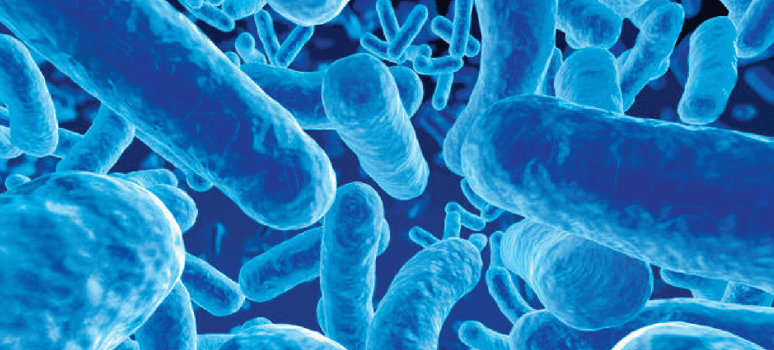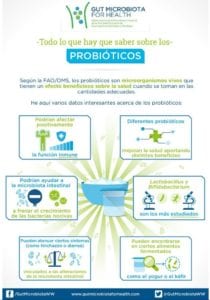
In our gut there is a universe of microorganisms that protect us from disease and activate our immune system, the mycobiota. That is why we in biological medicine attach so much importance to it: it is the source of our health.
The microbiotaor intestinal flora, is a microscopic world made up of 100 trillion bacteria in the gut that keep us healthy. On the one hand, it regulates the energy supply and on the other hand, it protects us from disease-causing viruses and bacteria.
This universe is rich in diversity; in our gut there are at least a thousand types of bacteria, some three million genes, around a thousand different types of bacteria, around seventy per cent of our immune system and one hundred million neurons that connect it to the brain. This richness is still being explored by the scientific community but the microbiota is considered an organ and we know a lot about the benefits of keeping it in balance.
What are the functions of the microbiota?
When we are born, the microbiota begins to develop in a process that lasts two or three years and, if not interrupted by antibiotic treatment, brings this organism to maturity. Throughout our lives, the type of food we eat and the consumption of medication will be the main risk factors for their balance, and therefore our health, is maintained.
The functions of this body are:
- Collect energy from food
- Improve bowel motility and bowel function
- Strengthens the intestinal wall
- Protects against pathogens
- Produces metabolites important for health
- Synthesises vitamins and hormones
- Supports the immune system
- Produces and modulates hormones
- Influences brain, liver, kidney or skin function
- Affects the circulation of lipids in the blood.
This gut flora is key to immune system responseA study published in the journal Cell in October 2017 reported on research coordinated by scientist Pere Santamaría, from Hospital Clínic-Idibaps and the University of Calgary (Canada), which uncovered the mechanism by which the microbiota can regulate the immune system's misguided response that leads to autoimmune diseases.
The attack by these cells causes inflammation and diseases such as colitis or Crohn's disease. In these cases, bacteria that are part of the gut microbiota act by alerting T-lymphocytes, a type of white blood cell, which go to the gut and act against the autoimmune disease.
From the perspective of the Biological Medicinewe advocate the importance of intestinal balance to maintain health. This is one of the key steps of the Biosalud Method, intestinal cleansing. We apply techniques such as colon hydrotherapy which, together with a balanced diet, allow us to restore balance to the microbiota.
What threatens the balance of this universe?
Diet, the consumption of antibiotics or stress are some of the factors that unbalance our microbiota, causing it to lose its defensive capacity.
Antibiotic use: Antibiotics act on bacterial infections and, in doing so, they can take away a large part of the bacteria in the microbiota that protect us from infections. We are talking about the overuse of antibiotics, not their use when necessary. More recently, antibiotics have been shown to destroy the intestinal epithelium where nutrients are absorbed and our immune system is located. In other words, antibiotics not only damage the defensive capacity of our microbiota but also affect the immune system itself.
Stress: Stress over time affects women's microbiota in the same way that food rich in saturated fat and sugars does. This effect alters the production of serotonin "which is 90 per cent out of the microbiota - making women more prone to depression. These are the findings of a study led by Professor Laura Bridgewater of Brigham Young University in the US.
Food as a source of health
We are what we eat. This is a statement that makes a lot of sense for biological medicine. As mentioned above, the treatments of Biosalud Day Hospital combine the therapy in our facilities with a diet that contributes to the restoration of the organism.
Considering the benefits for the microbiota, there are two types of food: probiotics and prebiotics.
In 2002, the World Health Organisation (WHO) defined the probiotics as "Micro-organisms live micro-organisms that, when supplied in adequate amounts, promote health benefits to the host organism. These micro-organisms are bacteria or yeasts that, when ingested in sufficient quantities, help to restore the intestinal probiota. They can be found in foods such as yoghurt and also in specific foods.

The prebiotics are foods that help the intestinal flora to grow, such as fruit, vegetables and nuts, and especially oat bran, barley, nuts, seeds, beans, lentils, peas and leeks.


4 thoughts on “El universo de la microbiota, el origen de nuestra salud”
I commend you for highlighting one of the consequences of the irresponsible use of antibiotics.
On the one hand, there is the ever-feared resistance of bacteria to such drugs.
On the other hand, there is the fact that antibiotics have side effects.
They should therefore only be taken under professional prescription.
Greetings!
Thank you for your comment.
Congratulations and thank you very much for taking into account people from other countries to give us such special information. I suffer from an autoimmune disease and I want to go to your clinic.
Thank you for your words. If you want to contact us, you can do so on 91 088 62 92.
Comments are closed.